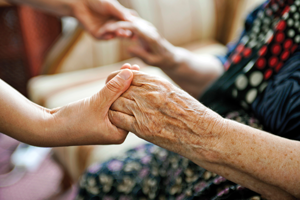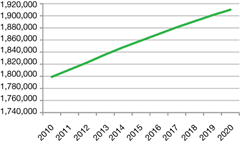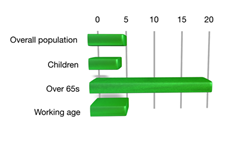Overview
 Care services will have to change and adapt to a rise in older people. Preventing poor health can reduce future demands. Meadhbh Monahan reports.
Care services will have to change and adapt to a rise in older people. Preventing poor health can reduce future demands. Meadhbh Monahan reports.
Northern Ireland’s population is set to age, with an 18.6 per cent increase in over 65s between 2011 and 2020 and a 42 per cent increase by 2025. The population of children (under 16) will increase by 4.3 per cent and every working age person will have the equivalent of three children or four pension age dependants from now until 2020.
These trends, from NISRA’s statistics, will have implications for all health policies, especially residential care planning and care for the elderly in hospitals. Provision of childcare in the face of an increasing elderly population will be an ongoing challenge.
Budget cuts have already resulted in nursing home closures and only those assessed with having the highest levels of need receiving a care package. With the working-age population, which generates the money for the health and pension systems, not growing as quickly as the elderly population, policy-makers are faced with decisions as to where to place money to anticipate future demand.
Meanwhile, the region’s health is getting worse, with more older people suffering from long-term illnesses and a rise in chronic conditions such as obesity and cancer, often resulting from smoking, alcohol and drug use and a sedentary lifestyle.
Thirty six per cent of 4,085 respondents to the 2010-2011 DHSSPS’ health survey were overweight, while 23 per cent were obese (8 per cent were children aged between two and 15.) A weight-loss specialist has warned that Northern Ireland is facing an obesity “tsunami” in the next five to ten years.
Northern Ireland is facing a shorter life expectancy and health inequalities mean that people from deprived areas will not live as long as those in more affluent areas. The Troubles had a lasting impact on the physical and mental health of the population and this has to be factored into future care planning.
The draft Programme for Government includes plans to enrol people who have a long-term condition in a dedicated chronic condition management programme and to spend £7.2 million on tackling obesity.
John Compton’s review will shape health and care services for the next generation. Health Minister Edwin Poots has said that there is a need to encourage “greater personal responsibility among members of the public for their own health and well-being.” This will require “a sustained and growing investment in public health, early diagnosis and early intervention services,” he insisted.
A 2009 EU policy brief (on how health systems can respond to ageing) recommends better co-ordination of care across health and social services and across different levels of health care, ensuring more treatments are done outside of hospitals (to reduce inappropriate hospital stays), reducing the risk of disease through health promotion and disease prevention programmes, and funding programmes that keep elderly people active and get them out and about.
A report commissioned from PwC by Independent Health and Care Providers, and supported by Age NI found that some older people face nursing home bills of up to £500 per week which they cannot afford.
Esmond Birnie, PwC’s Chief Economist, commented that while approximately 10 per cent of the DHSSPS £4.4 billion budget in 2009-2010 was spent on the social care system for older people, “demand is rising fast, [and] the provision of care, both in terms of funding and care homes, is falling behind.” He said that “this situation cannot continue and, in a period of severe financial constraint, a comprehensive reform of social care delivery and funding is now appropriate.”
This is an unprecedented time for Northern Ireland’s health and care sector. The McKinsey report warned the province’s Health Service will run out of money in four years unless fundamental reforms take place. Its recommendations (including intensive rehabilitation before assessing someone for social care, ending non-essential treatments like aesthetic ENT surgery and increasing the use of generic drugs) are to be treated as “an à-la-carte menu” by Poots. A UN report on ageing highlighted the gravity of the situation, saying: “We are in a situation without parallel in the history of humanity.”
Demographic groups (thousand people)
| 2011 | 2012 | 2013 | 2014 | 2015 | 2016 | 2017 | 2018 | 2019 | 2020 | |
| Children | 383 | 384 | 385 | 387 | 388 | 391 | 394 | 397 | 399 | 400 |
| Pension age | 308 | 310 | 312 | 314 | 316 | 318 | 320 | 322 | 324 | 327 |







